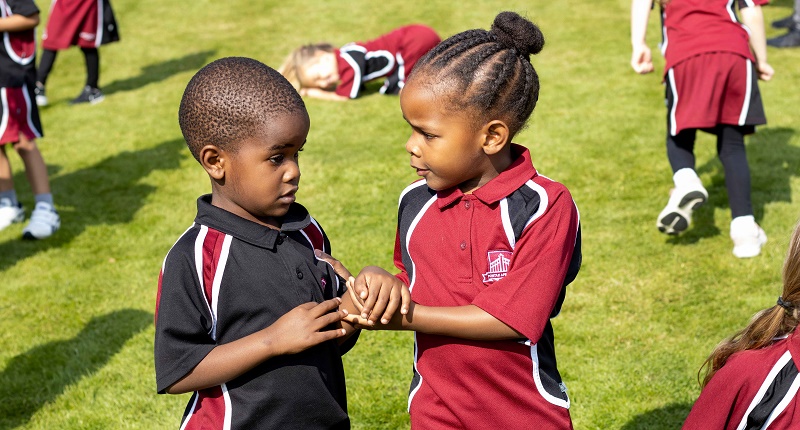


Find out how Gateways could provide the perfect educational environment for your child.
Find out more
Big enough to challenge, small enough to care
WHAT IS PSHE?
PSHE (personal, social, health, and economic) education became statutory for schools in September 2020, under the Children and Social Work Act. It has great importance for the well-being of young people. The Department for Education calls PSHE “an important and necessary part of all pupils’ education,” and that “all schools should teach PSHE, drawing on good practice.”
PSHE can not only improve the physical and psychological well-being of pupils, but it can also allow young people to develop skills that will enable them to become well-rounded members of society. Our High School Head of PSHE, appointed in September 2022, comments:
“PSHE is more valuable than ever for young people to not only gain academic proficiency, but to be endowed with a sense of agency and command over their personal, social, and emotional lives.”
At Gateways School, PSHE education gives pupils opportunities to foster skills in teamwork, leadership, communication, and collaboration, whilst learning about important information they will need to thrive and contribute positively to society. The schemes of work cover physical health, emotional well-being, relationship skills, British values, and employability skills, as well as educating young people on the risks that are ubiquitous in popular culture.
WHY IS TEACHING PERSONAL DEVELOPMENT IMPORTANT?
Teaching personal development is vital in many ways. It helps children develop their character, including mental wellbeing, sense of purpose, and independence, allowing them to become strong adults. Furthermore, the earlier we help children cultivate strength, vulnerability, and ownership over their thoughts and actions, the lower the chances they’ll feel burdened or afraid by life later on.
Personal development allows us to look at ourselves objectively and gain an awareness of how our internal programming might be hindering us or affecting how we behave. It is a lifelong process, and it is the reason personal development courses are offered to adults too. As adults, it can have an impact on our lives, both professionally and personally. It is why we want our pupils to be empowered with the blueprint for success and happiness from a young age.
HOW ARE GATEWAYS CONTRIBUTING TO PERSONAL DEVELOPMENT?
There are 60 minutes of PSHE learning a week. Our PSHE curriculum is carefully tailored to pupils so that they are not only age-appropriate but also stimulating and engaging.
Small class sizes mean there is a high staff-to-pupil ratio. This allows teachers to offer a bespoke and personalised education and can help them cater to the individual learner. At Gateways School, our small class sizes help children build confidence and have discussions, which aids in their learning and development.
PREP SCHOOL
In our Prep School, our PSHE programme is called Jigsaw. Jigsaw combines PSHE, mindfulness, emotional literacy, social skills, and spiritual development.
Our Head of PSHE in Prep School says:
“Jigsaw aims to help children know and value who they really are and how they relate to other people in this ever-changing world. It is a whole school approach. All year groups work on the same unit (puzzle) at the same time, and the learning is deepened every year.”
There are six puzzles in Jigsaw which are designed to progress in sequence from the beginning of each academic year. These include:
– Being Me in my World
– Celebrating Difference
– Dreams and Goals
– Healthy me
– Relationships
– Changing me
Our current puzzle is ‘Celebrating Difference’ which focuses on diversity and links in well with ‘Anti-Bullying Week’.
Every PSHE lesson contains mindfulness. This consists of teaching the children different breathing techniques, awareness exercises and visualisation. Mindfulness starts and ends with a chime. Pupils say that they like the chime part of the lesson because it makes them feel ‘calm’.
HIGH SCHOOL
In our High School, teaching PSHE for personal development is more comprehensive, with teaching being more in-depth and more opportunities for class discussions centred around the lesson. Due to the rapid growth of technology over the recent years, pupils are spending more time with digital technology, with children having access to their own tablets and phone from a young age.
Research has shown that older children and teenagers spend around 11 hours per day with media. That time adds up: young people are spending more time with technology than they do in school. It is therefore essential to be teaching our pupils how to balance their offline and online lives.
Although technology does have positives, it also has its drawbacks. It can prove to be detrimental to the mental health and well-being of children and this term there us a focus in mental health and wellbeing in our PHSE lessons.
PHSE is also reviewed by the pupils every half-term; the last survey included lots of positive feedback and it’s great to see the impact PHSE has already had this year.